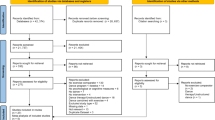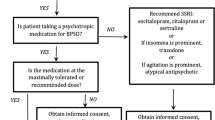Abstract
Purpose
Health-related quality of life (HRQOL) is an increasingly critical outcome of chronic illness care. However, its disease-independent attributes, particularly its spiritual resilient indicators, for people with Parkinson’s disease (PD) have not been explicitly examined. This study aimed to (i) assess the associations between psychological distress, spiritual resilience and HRQOL, and (ii) examine the mediating effects of spiritual resilience on psychological distress and HRQOL amongst individuals with PD.
Methods
This is a secondary data analysis of the baseline data of a clinical trial that involved 138 individuals with PD. The subjects completed a structured questionnaire assessing psychological distress in terms of anxiety and depression, spiritual resilience in terms of perceived affliction and perceived equanimity, severity of motor symptoms and disease-specific HRQOL.
Results
Analysis by independent t test suggested that distressed individuals with PD demonstrated less spiritual resilience and presented poorer HRQOL than non-distressed individuals with PD. Multiple linear regression models revealed that high emotional distress was associated with low spiritual resilience and poor HRQOL. The mediation analysis found that after simultaneously controlling for the degree of perceived affliction and perceived equanimity, a significant reduction was observed in the direct effect between psychological distress and HRQOL. This result indicated the partially mediating roles of perceived affliction and equanimity in the pathways between psychological distress and HRQOL.
Conclusion
In order to enhance HRQOL, PD interventions should address the spiritual resilience of patients in addition to providing psychological care and physical relief of symptoms.


Similar content being viewed by others
References
Auyeung, M., et al. (2012). Ten year survival and outcomes in a prospective cohort of new onset Chinese Parkinson's disease patients. Journal of Neurology, Neurosurgery, and Psychiatry, 83(6), 607–611.
Choi, E. P. H., et al. (2019). The mediating role of sleep quality in the association between nocturia and health-related quality of life. Health and Quality of Life Outcomes, 17(1), 181.
Kwok, J. Y. Y., Auyeung, M., & Chan, H. Y. L. (2020). Examining factors related to health-related quality of life in people with Parkinson’s disease. Rehabilitation Nursing, 45(3), 122–130.
Marsh, L. (2013). Depression and Parkinson’s disease: Current knowledge. Current Neurology and Neuroscience Reports, 13(12), 409.
D'Iorio, A., et al. (2017). Impact of anxiety, apathy and reduced functional autonomy on perceived quality of life in Parkinson's disease. Parkinsonism & Related Disorders, 43, 114–117.
Blakemore, R. L., et al. (2018). Stress-evoking emotional stimuli exaggerate deficits in motor function in Parkinson's disease. Neuropsychologia, 112, 66–76.
Landau, S., et al. (2016). Anxiety and anxious-depression in Parkinson's disease over a 4-year period: A latent transition analysis. Psychological Medicine, 46(3), 657–667.
Shamaskin-Garroway, A. M., Lageman, S. K., & Rybarczyk, B. (2016). The roles of resilience and nonmotor symptoms in adjustment to Parkinson’s disease. Journal of Health Psychology, 21(12), 3004–3015.
Reed, P. G. (2008). Theory of self-transcendence. Middle Range Theory for nursing, 3, 105–129.
Fahr, A., & Holmes, S. (2008). Spiritual resilience in old age. Gerontologist, 48, 288–288.
Cal, S. F., et al. (2015). Resilience in chronic diseases: A systematic review. Cogent Psychology, 2(1), 1024928.
Stewart, D. E., & Yuen, T. (2011). A systematic review of resilience in the physically ill. Psychosomatics, 52(3), 199–209.
Kwok, J. Y. Y., et al. (2019). The effects of mindfulness yoga versus stretching and resistance training exercises on anxiety and depression for people with Parkinson’s disease: A randomized clinical trial. JAMA Neurology, 76(7), 755–763.
Kwok, J. Y. Y., et al. (2017). The effects of yoga versus stretching and resistance training exercises on psychological distress for people with mild-to-moderate Parkinson's disease: Study protocol for a randomized controlled trial. Trials, 18(1), 509.
Leung, C. M., et al. (1993). Evaluation of the Chinese version of the Hospital Anxiety and Depression Scale. A cross-cultural perspective. International Journal of Psychosomatics, 40(1–4), 29–34.
Zigmond, A. S., & Snaith, R. P. (1983). The hospital anxiety and depression scale. Acta Psychiatrica Scandinavica, 67(6), 361–370.
Leung, C., et al. (1993). Evaluation of the Chinese version of the Hospital Anxiety and Depression Scale: A cross-cultural perspective. International Journal of Psychosomatics, 40(1–4), 29–34.
Rodriguez-Blazquez, C., et al. (2009). Psychometric attributes of the Hospital Anxiety and Depression Scale in Parkinson's disease. Movement Disorders, 24(4), 519–525.
Mondolo, F., et al. (2006). The validity of the hospital anxiety and depression scale and the geriatric depression scale in Parkinson's disease. Behavioural Neurology, 17(2), 109–115.
Chan, C. H., et al. (2014). Rethinking well-being in terms of affliction and equanimity: Development of a holistic well-being scale. Journal of Ethnic and Cultural Diversity in Social Work, 23(3–4), 289–308.
Goetz, C. G., et al. (2008). Movement disorder society-sponsored revision of the Unified Parkinson's Disease Rating Scale (MDS-UPDRS): Scale presentation and clinimetric testing results. Movement Disorders, 23(15), 2129–2170.
Tsang, K. L., et al. (2002). Translation and validation of the standard Chinese version of PDQ-39: A quality-of-life measure for patients with Parkinson's disease. Movement Disorders, 17(5), 1036–1040.
Opara, J., et al. (2012). Quality of life in Parkinsons Disease. Journal of Medicine and Life, 5(4), 375.
Chen, K., et al. (2017). Evaluation of PDQ-8 and its relationship with PDQ-39 in China: A three-year longitudinal study. Health and quality of life outcomes, 15(1), 170.
Tan, L. C., et al. (2007). Validation of PDQ-8 as an independent instrument in English and Chinese. Journal of the Neurological Sciences, 255(1–2), 77–80.
Baron, R. M., & Kenny, D. A. (1986). The moderator–mediator variable distinction in social psychological research: Conceptual, strategic, and statistical considerations. Journal of Personality and Social Psychology, 51(6), 1173.
Hayes, A. F. (2010) Introduction to mediation, moderation, and conditional process analysis: A regression-based approach 2017.
Sagna, A., Gallo, J. J., & Pontone, G. M. (2014). Systematic review of factors associated with depression and anxiety disorders among older adults with Parkinson's disease. Parkinsonism & Related Disorders, 20(7), 708–715.
Goodarzi, Z., et al. (2016). Detecting depression in Parkinson disease: A systematic review and meta-analysis. Neurology, 87(4), 426–437.
Schrag, A., & Taddei, R. N. (2017). Depression and anxiety in Parkinson's disease. International Review of Neurobiology, 133, 623–655.
Kalisch, R., Müller, M. B., & Tüscher, O. (2015). A conceptual framework for the neurobiological study of resilience. Behavioral and Brain Sciences, 38, e92.
Di Giacomo, D., et al. (2019). Survivorship in young women after early breast cancer: a cross-sectional study of emotional traits along 3-years perspective. Rivista di Psichiatria, 54(4), 160–167.
Seiler, A., & Jenewein, J. (2019). Resilience in cancer patients. Frontiers in Psychiatry, 10, 208.
Chan, C., Ying Ho, P. S., & Chow, E. (2002). A body-mind-spirit model in health: an Eastern approach. Social Work in Health Care, 34(3–4), 261–282.
Kwok, J. Y. Y., Lee, J. J., Auyeung, M., Chan, M. L., Chan, H. Y. L. (2020). Letting nature take its course: A qualitative exploration of the illness and adjustment experiences of Hong Kong Chinese people with Parkinson’s disease. Health Soc Care Community. https://doi.org/10.1111/hsc.13055.
Garroway, A. (2014). Resilience in Parkinson’s disease: An empirical examination of age-related components of the construct. In: Psychology. Virginia Commonwealth University.
Maxwell, S. E., & Cole, D. A. (2007). Bias in cross-sectional analyses of longitudinal mediation. Psychological Methods, 12(1), 23.
Imai, K., Keele, L., & Tingley, D. (2010). A general approach to causal mediation analysis. Psychological Methods, 15(4), 309.
VanderWeele, T. J., & Vansteelandt, S. (2009). Conceptual issues concerning mediation, interventions and composition. Statistics and its Interface, 2(4), 457–468.
Funding
Nil.
Author information
Authors and Affiliations
Contributions
JYYK had full access to all the data in the study and takes responsibility for the integrity of the data and the accuracy of the data analysis. Study concept and design: JYYK, EPHC; acquisition, analysis, or interpretation of data: JYYK, EPHC, PHC, JYHW, DYTF, MA; drafting of the manuscript: JYYK; critical revision of the manuscript for important intellectual content: JYYK, EPHC, PHC, JYHW, DYTF, MA; statistical analysis: JYYK, EPHC, PHCl; administrative, technical, or material support: JYYK, MA; study supervision: JYYK, MA.
Corresponding author
Ethics declarations
Conflict of interest
The authors declare that they have no conflict of interest.
Ethics approval
Ethics approval for this study was obtained from the Joint Chinese University of Hong Kong—New Territories East Cluster Clinical Research Ethics Committee (Joint CUHK-NTEC CREC) (Reference code: 2016.323-T).
Additional information
Publisher's Note
Springer Nature remains neutral with regard to jurisdictional claims in published maps and institutional affiliations.
Rights and permissions
About this article
Cite this article
Kwok, J.Y.Y., Choi, E.P.H., Chau, P.H. et al. Effects of spiritual resilience on psychological distress and health-related quality of life in Chinese people with Parkinson’s disease. Qual Life Res 29, 3065–3073 (2020). https://doi.org/10.1007/s11136-020-02562-x
Accepted:
Published:
Issue Date:
DOI: https://doi.org/10.1007/s11136-020-02562-x




